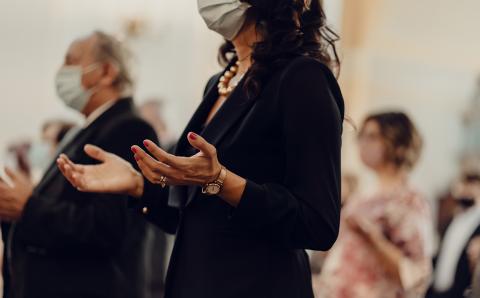I never experienced the God of rest until my junior year of college. I was sitting alongside the sandy shores of Lake Michigan and trying not to have an anxiety attack for three very good reasons.
One, I had made a commitment to spend the weekend away from my studies, work, and friends to sit in silence and stillness for about 48 hours through a silent retreat advertised at school.
Two, I was already precariously juggling said studies, work, and friends, falling hopelessly behind in my pursuit to be an honors student while maintaining an active social life and working three to five jobs at a time.
And three, I was genuinely terrible at being silent and sitting still.
Rather than listening to the lapping of the waves and the cries of the seagulls that first brisk, autumnal evening, my mind fell into a repetitive loop of all the things I had to do and the crushing guilt of “taking time for myself.”
I tried to pray and meditate, but my prayers fell flat. I am Type A and extroverted by nature. Silence and stillness, I figured, were spiritual gifts meant for others, not for Type A perfectionists like me.
As the first evening progressed, I nestled close to the fireplace, feeling exposed and bare by the lack of clocks and the transient nature of time. I decided to take out my copy of Rachel Held Evans’ “A Year of Biblical Womanhood.” At least reading seemed somewhat productive.
Turning that first page, I immediately saw myself in Evans—the loud-mouthed, opinionated Christian feminist who seemed sassy, challenge-oriented, and rest-evasive.
My smile quickly faded, however, as I read the first chapter on cultivating a gentle and quiet spirit—a chapter that felt eerily similar to my current experience. I could almost feel God laughing as I followed the story of a woman like myself wrestling with rest and silence.
Flipping to the end, I came to recognize my aversion to silence and stillness for what it was: fear. I was afraid of missing out on opportunities. I was afraid of falling behind. I was afraid that, in the absence of accomplishments and awards, I’d become unloved and unworthy. The hustle and busyness was a mask for the fear and self-doubt I’d tried so well to hide.
And yet, if Evans could tackle stillness and silence, I figured, so could I.
I left the silent retreat committed to overcoming my fear, starting first with meditation and then moving on to practicing the Sabbath and devoting mornings to contemplation.
The more I faced my fear, the less grip it had on me.
As I worked through my insecurities and doubts, I became more confident, more grounded, more self-assured.
As part of Gen Z, I find rest is now an act of resistance. It’s a resistance against the digital age I grew up in, one of fast turnaround times and 24/7 access to texts, tweets, and emails. It’s a resistance against a capitalistic system that turns humans into numbers and workers into timesheets. It’s a resistance against a social-media world that constantly makes me feel that I am not good enough, smart enough, pretty enough, or hard-working enough.
It’s a resistance that allows me to just be.
I am working on resting. I am not there yet. There are days where I get swept up in the hustle and bustle of day-to-day life, jumping from one activity to the next.
But since that silent retreat, I can now see the importance of presence and rest.
In rest, I found healing. In rest, I found God.
About the Author
Dana Drosdick is a Calvin University graduate and marketer in Glens Falls, N.Y. Her work, inspired by her Christian Reformed roots, has been previously featured in Chicken Soup for the Soul and TheOdysseyOnline. Follow her online at instagram.com/danadrosdick.








